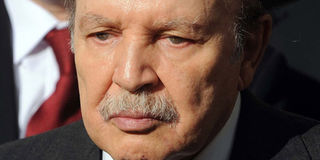Ailing Bouteflika the favourite in Algeria’s presidential election

PHOTO | AFP A picture taken on January 24, 2012 shows Algerian president Abdelaziz Bouteflika addressing journalists after welcoming the Moroccan foreign minister in Algiers.
What you need to know:
- The 77-year-old has appeared only rarely in recent months, and his decision to seek a new mandate has provoked derision and drawn sharp criticism from senior political figures questioning his ability to rule after he suffered a mini-stroke last year.
- Bouteflika has promised constitutional changes that would create a “broad democracy” if re-elected on April 17, in a statement read by his campaign chief.
ALGIERS
Algeria’s Abdelaziz Bouteflika, who is running for a fourth term in Thursday’s presidential vote, is widely expected to win despite his frail health preventing him from even campaigning.
The 77-year-old has appeared only rarely in recent months, and his decision to seek a new mandate has provoked derision and drawn sharp criticism from senior political figures questioning his ability to rule after he suffered a mini-stroke last year.
But he remains popular with many Algerians who credit him with helping to end a devastating civil war and contain Arab Spring protests.
A veteran of the war of independence against France, Bouteflika came to power in 1999, but his more recently been dogged by ill health and corruption scandals.
ANOTHER PUPPET
He has also never freed himself from the pervasive control of the military, despite being determined to roll back its influence and curb the powers of its intelligence heads who have dominated politics since independence.
“I’m not three quarters of a president,” he said after being elected in 1999, addressing critics who saw him as another puppet of the army.
Despite efforts to reduce their influence, the army and the DRS intelligence agency are still widely considered to be the real power in Algeria.
The army has chosen all of the country’s post-independence leaders — and Bouteflika was no different.
With the military’s support, he stood unopposed in 1999 as the candidate of the ruling National Liberation Front (FLN) after all the other candidates withdrew, citing fears of electoral fraud.
But Bouteflika has promised constitutional changes that would create a “broad democracy” if re-elected on April 17, in a statement read by his campaign chief.
Meanwhile, a man was killed on Saturday in the southern Algerian town of Ghardaia, the second fatality in less than 24 hours of ethnic violence between Berbers and Arabs in the region, local sources said.
A Berber in his 40s was stabbed early morning, Hamou Mesbah, a senior member of the opposition Socialist Forces Front, told AFP.
And Abdallah Zekri, spokesman for the Collective of Mozabites (Berbers) in Europe, said the man had been taken “by a gang, tortured, stabbed” and his corpse “thrown in front of a mosque.”
Zekri said the dead man’s family needed police protection to recover his body.
Ghardaia has been the scene of violence since December when fighting erupted between Berbers and Arabs. The violence has killed 10 people and wounded more than 400.





